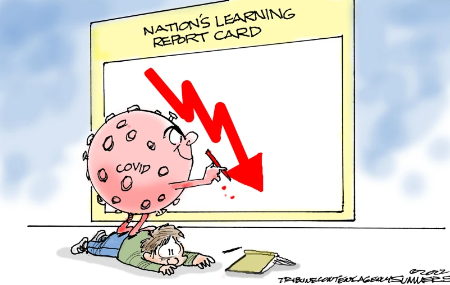Looking back at learning loss

FCPS made multiple adjustments to support students during and after the pandemic including a rolling grade book, increasing max retake scores, adjusting the minimum grade to 50%, exempting students from mandatory SOL’s, canceling final exams, and accepting late work for up to two weeks. And now, it appears evident that these changes have done more harm than good. Teachers are struggling to deal with the fallout from these decisions.
“This blanket approach is not effective,” says Ms. Lee, an English teacher at South Lakes. She said it created a sense of apathy among students who recognized that they could get by with very little effort.
Camera use was not required in the virtual classroom, so student focus was minimal at best. When students returned to school it was obvious to teachers how much learning loss occurred. Learning loss was not the only observation teachers made; they also noticed the lack of motivation and development of social skills among students.
Elementary school students were hit the hardest from critical learning loss since a foundation for learning is acquired during the elementary years. Many students lack the executive functioning skills they would have developed in school. On average students learned 35% of what they would have in a typical school year, according to the Nature Human Behavior journal.
When students returned to school, teachers were tasked with catching students up on skills that they were lacking as a result of online learning. Teachers are observing the challenges students face with meeting deadlines, attentiveness, and punctuality. These are key life skills that should be learned in high school, but the pandemic has hindered the ability of schools to prepare students in this way.
“If our goal is to prepare [students] for the real world, we’re not doing that,” states Ms. Lee. “In no way shape or form in the workforce can you say ‘oh ask them for an additional week.’ That takes time. That costs money. That’s poor productivity and at some point it needs to stop.”
There should be support for students, but there still needs to be an expectation that students should try their best to create quality work, meet deadlines, and communicate effectively with others.
The Covid-19 pandemic devastated the world and schools are still grappling with the aftermath. The effects of the pandemic in all grade levels will continue to be seen for decades to come. Schools need to refocus expectations and prepare students to thrive in the real world.

Amany Nassar is a Junior at South Lakes and this is her third year writing for the Sentinel. She loves to read in her free time along with playing flag...
















